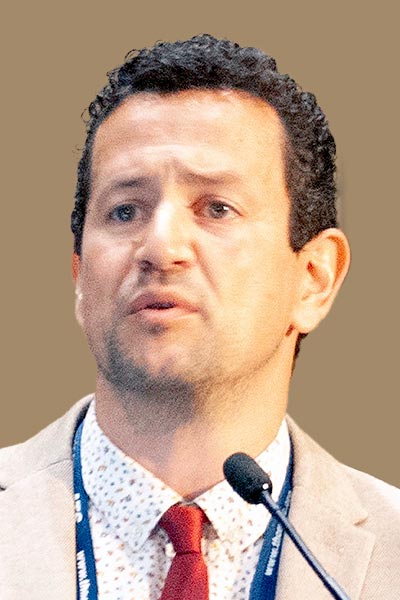Defining obstructive sleep apnea phenotypes is necessary for identifying pathways of disease, directing more precise care, and predicting long-term complications, said Manuel Sánchez De La Torre, PhD, of Institut de Recerca Biomèdica de Lleida Fundació Dr. Pifarré in Spain.

Dr. De La Torre opened the scientific symposium, Pathways Towards Personalized Sleep Medicine: Integrating Endotypes, Medical Informatics, and Multi-Omics, on Monday, May 16, at ATS 2022.
He explained that the effect of OSA might not always be homogeneous, because it can be both deleterious and protective depending on the endotype of the patient. For instance, he said that studies have shown that CPAP treatment may prevent hypertension in patients with a non-dipping blood pressure pattern, and that it does have a cardioprotective effect on patients with cardiovascular disease.
He noted, though, that researchers are still evaluating whether it can prevent acute coronary syndrome in patients who have had no previous cardiovascular disease.
Brian E. Cade, PhD, Brigham and Women’s Hospital, spoke next about genomic and sex-specific factors as targets for sleep-disordered breathing subtyping and risk stratification.
Studies have found that genetics and the way health care is used demonstrate significant differences in the genetics of sleep-disordered breathing in men and women, as well as in outcomes, Dr. Cade said.
Multiple disorders, he said, are enriched in women versus men, including chronic pulmonary heart disease, congestive heart failure, and chronic renal failure. Women have an overall higher comorbidity profile that is also present at the first sleep-disordered breathing diagnosis.

“This underscores the need for a sex-specific approach to understanding sleep-disordered breathing causes and consequences,” he said.
Rene Cortese, PhD, University of Missouri, followed with a presentation on the emerging field of epigenomics in sleep disorders.
Dr. Cortese discussed one of his studies, which found that chronic intermittent hypoxia causes the aortic wall to recruit macrophages even when there are no other predisposing factors like a high-fat diet. The discontinuation of the CIH for six weeks, he said, did not improve the elastic laminae of the aorta wall inflammatory cells. And CIH causes a complex interplay of histone modifications activating and silencing gene expression in functionally relevant pathways like inflammation and oxidative stress.
“The epigenetic phenomena are key contributors in the homeostasis and control of sleep,” said Dr. Cortese, adding that applying an epigenetic marker and using targeted epigenetic interventions might be useful for mitigating or resolving adverse effects of sleep disorders.

Neomi A. Shah, MD, MPH, MSci, Icahn School of Medicine, wrapped up the session with a discussion about designing new randomized control trials for cardiovascular prevention in patients with OSA.
Among the criticisms of current RCTs, she said, is that excessively sleepy patients are excluded. There is also bias in the recruitment approaches when it comes to patients coming from general medicine physicians, cardiologists, and sleep specialists. Sleep studies should stick to those patients coming from sleep specialists, said Dr. Shah.
Another criticism is the lack of a consistent definition of CPAP adherence for RCTs. There is some debate, she said, about whether CPAP adherence is ideal in drawing accurate conclusions in RCTs. The consensus, she noted, seems to be that the mean CPAP adherence is about three to four hours.
In addition, she said, RCTs for sleep studies tend to be underpowered, as compared to most clinical trials, which may have tens of thousands of participants.
REGISTER FOR ATS 2024
Register today for the ATS 2024 International Conference! Don’t miss this opportunity to take part in the in-person conference, May 17-22 in San Diego. Join your colleagues to learn about the latest developments in pulmonary, critical care, and sleep medicine.
Not an ATS member? Join today and save up to $540.
